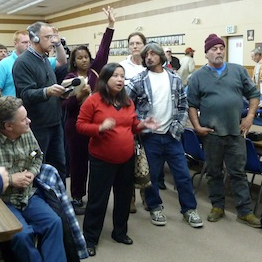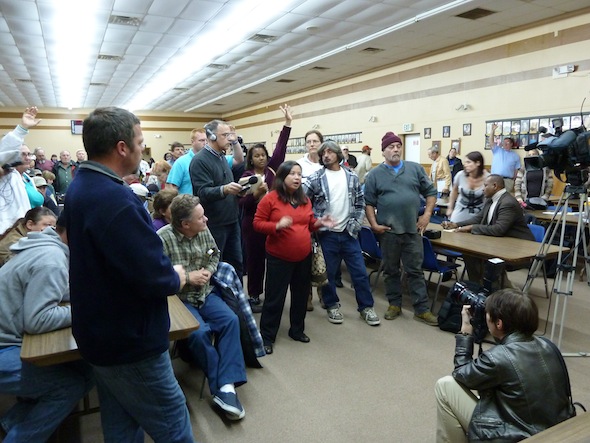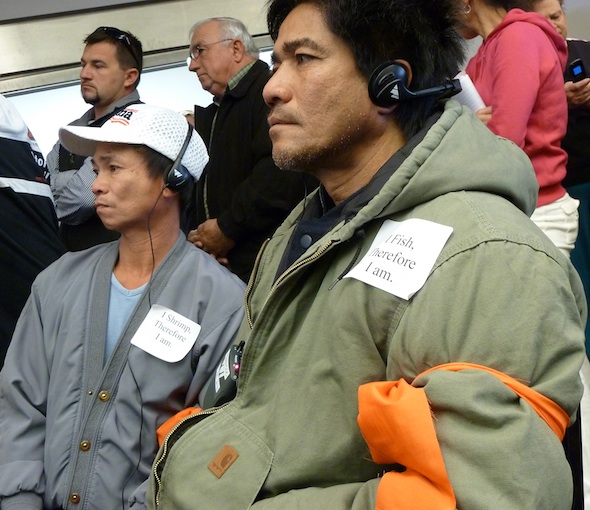Feinberg blasted in public meetings across Gulf Coast
 In two weeks of public meetings across the Gulf Coast, Kenneth Feinberg is hearing pointed criticism of the claims process he is leading. Residents point to inconsistency and lack of transparency as major problems.
In two weeks of public meetings across the Gulf Coast, Kenneth Feinberg is hearing pointed criticism of the claims process he is leading. Residents point to inconsistency and lack of transparency as major problems.
In three of those town hall meetings last week in Louisiana and Mississippi, residents called for his resignation, suggested changes to the process, expressed anger over their denied claims, and even brought along massive binders and manila folders filled with their financial records, some of which had been denied for “insufficient documentation.”
Throughout the meetings, the anger and growing desperation in these coastal communities was never far below the surface.
Anger rises in Bay St. Louis
In a packed American Legion Post in Bay St. Louis, Mississippi, a father described having his claim denied, while his son received a payment. They worked together on the same shrimp boat.
People spoke again and again of glaring inconsistencies like this in their communities, workplaces, and families, as some get fat settlement checks and others get nothing.
Amy Sullivan, who works at the Hard Rock Casino in Biloxi, Mississippi, says some of her co-workers received payments but she was denied. “Why is it so inconsistent? You can call the 800 number, hang up, call back and get a completely different answer.”
 Thao Vu questions Feinberg in Bay St. Louis. Photo by Ada McMahon.
Thao Vu questions Feinberg in Bay St. Louis. Photo by Ada McMahon.
Feinberg says he’s improving the process by hiring local representatives to supplant the 800 number, improving the methodology for determining how to pay claims, and making that methodology transparent. He says the improved methodology will be posted online within a month.
But many see the fact that the methodology is not yet ready or transparent as a problem. They say they hoped to have more concrete answers during these meetings, but it's more of the same.
Ray McGill, a 35 year old from Picayune, Mississippi, says things were going well for him before the oil disaster – he had just opened up a restaurant, Ray’s Shrimp Shack, in February 2010. “It was doing really good. I kept a packed house. I offered gumbo; I offered Dungeness crab, blue crab.”
Now, Ray’s Shrimp Shack is out of business. Like so many at this meeting he is there to ask about why his claim was so low, “when I know that all of my documentation is right.” He received just $6,200 to cover the losses his seafood restaurant, shrimp boat, and trucking business have sustained since the BP disaster began. “I’m just trying to hang on, pay my bills anyway I can. I’m trying to cut hair on the side, barbering… It’s hard. The economy’s bad, and I just don’t know where else to turn… We are all hurting.”  Ray McGill in Bay St. Louis. Photo by Ada McMahon
Ray McGill in Bay St. Louis. Photo by Ada McMahon
Grand Isle: Mr. Feinberg, you’re fired!
At a late afternoon meeting in the community center on Grand Isle, Louisiana, resident Karen Hopkins gave Mr. Feinberg his walking papers, a petition calling for his resignation signed by about 400 people. She says even more would have signed, but were afraid of retaliation from Feinberg, who holds the economic future of so many Gulf residents in his hands.
The petition calls into question the legality of some of Feinberg's policies, like requiring that people sign away their ability to sue when they accept a final payment. It also criticizes the way Feinberg’s operation, the Gulf Coast Claims Facility, has handled health claims. Cherri Foytlin, who co-founded Gulf Change with Hopkins and others, says only about 50 out of 400 medical claims have been approved.
Hopkins says that the problem lies not just with a massive compensation process that is bound to face challenges, but with Feinberg himself; “[He] is not doing a good job, because he is not of us. He doesn’t have the heart that it takes to administer that fund fairly...”
Solidarity across race in Lafitte
A forty minute drive south of New Orleans, in Lafitte, Louisiana fishermen in the standing room only crowd wore orange ribbons around their upper arms, and stickers identifying their place in the seafood industry: “I shrimp therefore I am,” “I shuck therefore I am,” “I crab therefore I am,” in Vietnamese and English.
Daniel Nguyen explains that the ribbons “show solidarity amongst race, amongst different industries.” Nguyen works for the Mary Queen of Vietnam Community Development Corporation, which organized translation and a charter bus to make sure the Vietnamese community in and around Orleans Parish could participate. Fishermen listen to a Vietnamese interpreter at the Lafitte meeting. Photo by Ada McMahon.
Fishermen listen to a Vietnamese interpreter at the Lafitte meeting. Photo by Ada McMahon.
Thieu Tran, a Vietnamese-American longline fisherman, explains through Nguyen’s translation that the claims process is particularly difficult for people with limited English proficiency to understand and negotiate. He himself received a settlement with help from Mary Queen of Vietnam CDC and other nonprofit groups.
The assembled groups, representing white, Vietnamese, and African American communities across the gulf states, gave a letter to Feinberg calling for specific improvements to the process, including a separate claims process that addresses fishermen’s needs. Tracy Kuhns of Louisiana Bayoukeeper presented the letter, saying there were obvious problems with how many fishermen were being denied or unfairly compensated. “We need to hire local people with a good understanding [of the seafood industry]” to help with claims, she said.
There were more stories of desperate situations as individuals tried to get their claims addressed. Elmer Rogers, a fourth generation, African American fisherman from Empire, Louisiana, dropped to his knees in a dramatic appeal to Feinberg:
“Let me tell you my situation… Thanksgiving, [my claim] was ‘under review’. My kids barely ate. I barely ate. Christmas came, my child’s 13 years old, she got nothing. You know what she woke up to? No water in her house, and no power… I had to go to my church with a bucket [to get water]… Let me go turn my water on. Let me pay my bills…
I’m not asking for the world, I’m just asking for something to live on, man. That’s all I’m asking from you. What do you want me to do? Do you want me to get on my knees and beg you for it? Look, I’m here, I’m on my knees for it. I need my money sir. To live.”
Feinberg responded, “You’ll hear from me personally within the next day.”
 Elmer Rogers presents his claim to Kenneth Feinberg. Photo by Ada McMahon.
Elmer Rogers presents his claim to Kenneth Feinberg. Photo by Ada McMahon.
Though Rogers was glad to have Feinberg's personal attention (the administrator did follow-up the next day and grant his claim), he is concerned that all of these denied claims are intentional, “Their game plan is to starve us out. To make sure [coastal residents] don’t have nothing… don’t have water in their home, lights in their house, about to lose their home. That’s when they give them those quick payments… He’s going to starve us out to where these poor fishermen will take anything.”
The quick payments allow individuals who are dissatisfied with their initial claim to accept $5,000, regardless of documentation. In return they must sign away their right to sue.
Feinberg repeatedly told people that he didn’t care what option they chose to pursue, and they could decline to file any claim at all, “the choice is yours.” But with the kind of desperation Rogers exemplified, most people feel they are between a rock and a hard place. Passing on quick money now for the option to sue later is an unlikely choice for people like Mr. Rogers, who had to sell his truck last month to make his mortgage payment.
Related posts:
